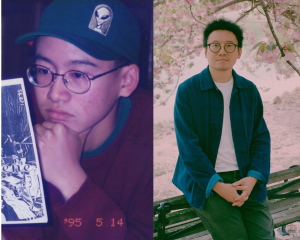Music for Community introduces music theory at Dilworth
Photo by Audrey Sun. Graphic Illustration by Calvin Zhou
Students in Music for Community teach music theory to local preschool students
October 10, 2022
As Music for Community members draw a series of musical notes across the whiteboard, preschool students sing along to scales and clap to rhythms. Twice a month, MFC members make their way over to Dilworth Elementary School with their instruments to teach local preschool students the fundamentals of music theory.
MFC’s goal is to spread their passion for music to the rest of the community. They regularly perform at senior centers and benefit concerts, teach music theory to students and organize busking events, during which musicians perform in public areas such as public parks and subway stations.
One of MFC’s most noteworthy activities is Waha, a music theory class taught by members that caters to local preschool students at Waha Montessori Preschool. Before a typical class, officers prepare basic curriculum and activity ideas corresponding to the concepts that will be taught. The instruction period itself is usually made up of a combination of prepared content and improvisation.
“My favorite type of lessons to teach are rhythm lessons,” MFC Treasurer Luke Li said. “We like to switch between words with different amounts of syllables to teach them a variety of note rhythms.”
Generally, classes are taught by members first demonstrating scales on instruments, then asking students follow-up questions and setting up games. In order for students to better engage in classes, members teach less complicated and more entertaining concepts.
“I know I would have loved a program like this when I was in preschool,” junior and MFC Activities Coordinator Stephanie Li said. “It helps students explore music and the beauties of it instead of being thrown into an environment of just repeated practice.”
Aside from teaching the fundamental concepts of music theory, MFC prioritizes student engagement, a challenge given the young age of participants, so they plan an assortment of fun activities to keep students actively involved and interested in the class. Members also play song requests from students on their own instruments to show students the various ways their favorite pieces can be played.
“I find that teaching the Waha classes and sharing my passion for my instrument brings me a lot of personal fulfillment,” Luke Li said.
Helping younger students gain early exposure to music education is one of MFC’s primary goals. Music education early in life is often parent-driven, meaning students are often pushed to learn to play instruments their parents are interested in. However, participating in Waha allows students the freedom to explore their own interests and exposes them to a variety of instruments and musical pieces.
“It’s nice to see the excitement when younger kids start to learn music for the first time,” junior Annabel Qin said. “The novelty and simple happiness wears off as the years progress for us, so seeing them so passionate has helped me rediscover music as something fun rather than tiring too.”
In the upcoming year, MFC plans to expand their curriculum by incorporating music history, through which they will explore different genres and the time periods associated with them.
“Through covering more aspects of music, we hope to keep the class engaged and allow each student to discover their own interests,” MFC President Samantha Huang said.



























































